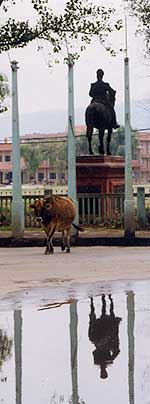 In the years that I have translated Nepali literature for this column, I have been moved by the eloquence of our poets and writers, I have been provoked by their messages and I have been humbled that they keep writing despite the few rewards for doing so. Nepali literature is young, and growing, and it deserves our attention, respect and nurturing-not because this is a 'cultured' thing to do, but because our society, and our lives, are enriched when we read and appreciate our literature.
In the years that I have translated Nepali literature for this column, I have been moved by the eloquence of our poets and writers, I have been provoked by their messages and I have been humbled that they keep writing despite the few rewards for doing so. Nepali literature is young, and growing, and it deserves our attention, respect and nurturing-not because this is a 'cultured' thing to do, but because our society, and our lives, are enriched when we read and appreciate our literature. What I have been most grateful to be able to do, over these years, is to highlight the tradition of writers raising voices of conscience. Since the time of popular ferment against Rana rule, Nepal's writers have powerfully criticised the economic inequality and social injustices that hollow Nepali citizenship of meaning. They continued to speak out at great risk through Panchayat times. During the endless muddling of the 1990s, and now, as the country struggles to salvage democracy from authoritarian rule and militancy, our poets and writers keep reminding us of the ethical imperatives of the day.
Chandrakala Newar, one of a small number of established Nepali women poets of today, upholds this admirable tradition. Her first poem, below, criticises the farcical nature of our public life:
Spectacle
Truth is becoming derelict
Untruth is flashing a smile
The puppet is dancing to tune
The stage is lit in self-satisfaction
and the dance hall glitters
with hordes of onlookers
swarming about
Depraved smiles writhe
and stick like leeches on bodies
even though they are slathered in salt
The switch of time
lashes the naked back:
So what?
The back has itself become
as hard as a tortoise shell
Ah, look-
Look at the spectacle being staged before us!
Newar's second poem tackles the most urgent ethical challenges before Nepal-hunger and poverty-and explores the sacrifices made to allay them. Though this poem was not written in the context of the current war, it brings to mind the policemen and soldiers who have lost their lives as they try to provide for their families' needs.
His son is hungry
He used to be hungry
and yet he could smile
placing others before him
to take in the warmth of the sun-
He offered his chest to searing bullets
The face of his hungry son
danced before his vision
His quivering lips said-
This year for Dasain
I'll bring you new clothes
We'll sit together and eat
meat and rice, bananas and curd
I'll connect my love to my beloved
and pour out the worries in my heart
This year for Dashain
I'll bring you new clothes
As with the tremors of an earthquake
his grave now trembles and creaks
His promises have turned into falsehoods-
Who will convey this message?
His love will weep
His son is hungry
Newar's last poem is a poem for our times-expressing the pent-up rage, the rightous wrath turned murderous-that fuels today's war.
War
I am unafraid
I am untranquil
I will come to life
in the defenceless Dalit souls
of the pridefulness that you have birthed
I will transform each soul into a battleground
I will swallow your sun
I will swallow your moon
I will show you dreams
to light up your sky-
Purity in blood
Contentment in tears
Life in killing
Avarice in peace
I will add dream upon dream
I will release white doves
whose feathers have been hacked off
You won't be able to tell-
By then I'll have gone mad!
Newar's poems can be read in her collection Chakrabyuha.
Nepaliterature has been a fortnightly feature in Nepali Times ever since the paper started three years ago. Manjushree Thapa will continue to translate Nepali literature on an occasional basis for Nepali Times, but this is the last regular fortnightly column. - Ed


